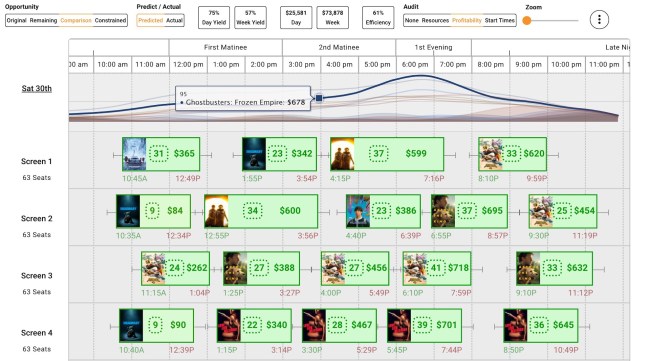“AI” is a Hollywood swear word, only muttered at CinemaCon 2024 after a certain number of daiquiries. In booth #2618A on the trade show floor, it was a pitch.
In our search of the hundreds of participating CinemaCon 2024 vendors, Indy Cinema Group — born in the UK and optimized out of Yosemite — was the only company bold enough to plant its AI flag in Las Vegas this week.
The indie app, developed by aerospace engineer-turned-theatre owner (yes, that old story) Keith Walker, is poised to replace the five or six computer systems a movie theater already uses. Indy will sell your tickets and your concessions, sure, but its real power is in the data. Selling to loyal customers has never been easier, and staff has never been more efficient.
Indy will learn what your customers like to see, eat, drink, where and when they like to sit, and even how long they’ll wait in line for Twizzlers. From there, theaters may decide that it’s worth adding another 2-3 hour shift to keep wait times down — or, that making candy will cost more in labor. Indy’s AI starts with theater demographics and instantly tweaks everything, including a predicted profit and loss statement that automatically adjusts with each incremental decision. It’s a one-click shop for running a movie theater.
Indy costs a few grand per month, but the company maintains that its utility will cover those costs and then some. This could mean more popcorn sales (where profits are higher) and/or fewer workers just standing around, a cardinal sin in exposure. With movie theater margins squeezed tighter and tighter, every shift, screen, and showtime counts.
Not all humans at CinemaCon 2024 were psyched for AI. Aziz Ansari, while introducing his new film “Good Fortune”, joked that he had to make his directorial debut after seeing what OpenAI’s Sora could do. “There are AI theater owners, AI executives, it’s coming,” he said.
It was also a talking point for MPA CEO Charles Rivkin. The studios he represents are obviously very interested in the development of AI and its role in entertainment. However, while studios negotiated AI rules with the WGA, SAG, and DGA last year, MPA will focus on lobbying Congress to ensure that AI does not infringe copyright. .
Currently, AI-generated content is not eligible for copyright. MPA supports that position, but has cautioned Congress to tread lightly as it drafts federal legislation that would prevent unauthorized copying of likenesses and voices. While this would protect performers and musicians, it could also run the risk of running afoul of the First Amendment.
Although Rivkin said the MPA shares actors’ concerns about how their digital copies can be used without consent, he believes most of the issues surrounding AI are rooted in existing copyright. are covered by law and do not need to be changed.
“We cannot support any law that takes away our ability to tell our stories,” Rivkin said at an April 9 press conference. For example, Rivkin cited the idea that making “Forrest Gump” might be illegal because it used a digital replica of John F. Kennedy. His concern is that current language in the legislation doesn’t clearly define ideas like animated dummies and inadvertently hinders productions like SNL’s digital shorts or “South Park.”
“That’s not the intent of the legislation,” he said. “We just want to make sure that we can protect the people who make a living using digital replicas, but also not stop us from making documentaries or parodies. We have to make sure that we Don’t go out unknowingly.
